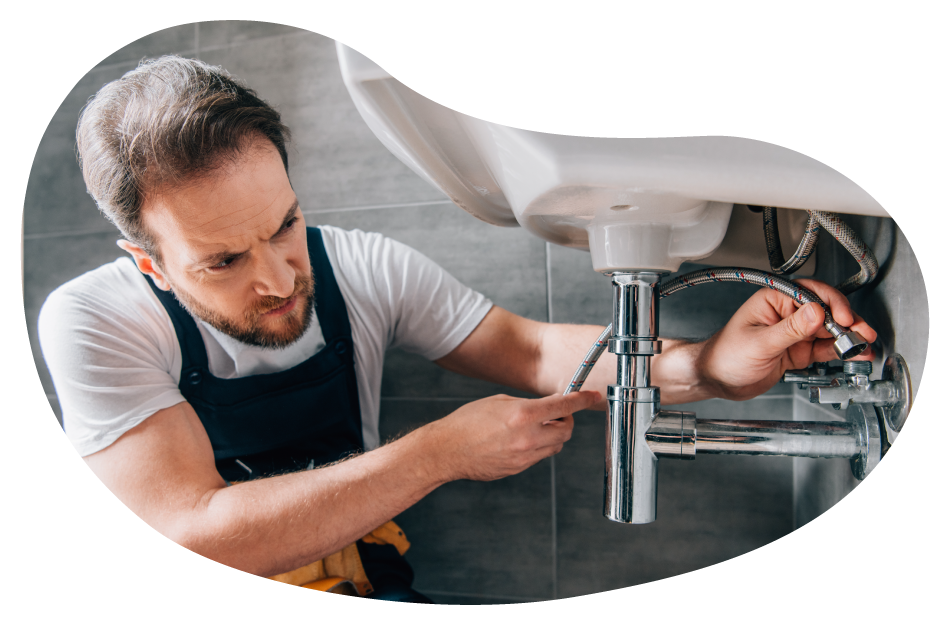

Why is business insurance a must for plumbers?
Water leaks and faulty parts are not only major headaches, but can result in a lawsuit that could financially devastate your business. Plumber insurance helps cover medical bills and legal costs from injuries and accidents, and it's often required to get licensed.

Get the right insurance
6 insurance policies every plumber should consider
General liability insurance
A general liability insurance policy protects plumbers against legal expenses related to client property damage and injuries. It's often required by commercial leases and contracts.
- Client bodily injuries
- Accidental damage to client property
- Libel, defamation, and copyright lawsuits
Business owner's policy
A BOP bundles commercial property insurance and general liability coverage at a discount. It's often the most cost-effective type of insurance for a small plumbing business.
- Accidental client injuries
- Damaged client property
- Storm and fire damage
Workers' comp insurance
Most states require plumbing companies with employees to carry workers' comp to help cover workplace injuries. In some states, even sole proprietors who work in construction must have this policy.
- Medical costs from work injuries
- Disability benefits
- Lawsuits from workplace accidents
Commercial auto insurance
Plumbers with business-owned vehicles must carry commercial auto coverage to comply with state laws. It helps cover financial losses in an accident, including legal costs and property repairs.
- Auto accident injuries
- Auto accident property damage
- Theft of a plumber's vehicle
Contractor's tools and equipment
A type of inland marine insurance, business tools and equipment insurance protects your equipment wherever you bring it. That includes items in transit to jobsites, stored off-site, or at a client's home.
- Equipment that is less than five years old
- Items valued at under $10,000
- Tools that travel to plumbing projects
Professional liability insurance
Professional liability insurance covers legal fees related to a mistake, missed deadline, or other accusation of professional negligence. It's also called errors and omissions insurance (E&O).
- Project delays and budget overruns
- Damage caused by mixed metals
- Water leaks from improper installation
Plumber insurance costs

Here's a quick look at the average cost of plumber insurance policies purchased by TechInsurance customers:
General liability: $115 per month
Business owner's policy: $166 per month
Workers' compensation: $195 per month
Factors that can influence plumbing contractor insurance costs include:
- Services offered, such as residential or commercial plumbing
- Number of employees you have, including subcontractors
- Types of insurance purchased
- Policy limits and deductibles
- Exclusions and endorsements, such as an additional insured
- Claims history
Start a free application to see how much insurance will cost for your business.
Hear from customers like you who purchased small business insurance.
Why plumbers choose TechInsurance
Get insured quickly with TechInsurance
Get insurance fast so you can get started working with clients. Fill out our easy online application, choose a policy, and pay online to start coverage today.

Common questions about plumbing insurance
Find answers to frequently asked questions about plumbing contractors' insurance requirements and licensing.
Do plumbers need professional indemnity insurance?
Professional indemnity insurance, often called professional liability insurance, helps pay for customer lawsuits stemming from an accusation of professional negligence. That includes mistakes, oversights, and missed deadlines that financially impact a customer.
While not usually required, it's strongly recommended for both plumbing companies and plumbing contractors. That's especially true if your business does plumbing design or consulting work for clients.
Here are a few situations where a professional liability policy would protect a plumbing business:
- A plumber joins two incompatible metals, which corrode and cause water damage inside the walls of a house.
- An improperly installed water heater leaks and damages a basement and its contents.
- A plumber misses an appointment to install a new sink, forcing a coffee shop to delay its grand opening.
A simple mistake can lead to tremendous out-of-pocket costs if you're not adequately protected. The right plumbing liability insurance pays for legal expenses if you're blamed for a leak or other damage, and provides peace of mind so you can focus on your work.
What other insurance policies do plumbers need?
In addition to those mentioned above, there's a wide range of plumbing insurance policies to match the specific needs of your business.
Plumbing professionals, including sole proprietors, should consider the following policies:
- Builder's risk insurance provides coverage for a structure being built at a construction site, along with pipes and other materials. It's also called course of construction insurance.
- Commercial property insurance covers your office building and everything in it, including computers, tools, and furniture. It helps you recover after a fire, storm, or burglary.
- Business personal property (BPP) insurance can be added to your general liability policy as an endorsement to cover business property kept at a fixed location, such as your office.
- Inland marine insurance is a type of plumbers tools insurance that goes wherever you go. It covers tools and equipment in transit, stored off-site, or at a jobsite.
- Commercial umbrella insurance boosts the coverage on your general liability, commercial auto, and employer's liability insurance once the policy limit is reached.
- Business interruption insurance, also called business income insurance, covers day-to-day operating costs and lost income resulting from a fire or other covered property claim. You can usually add it to your property policy or BOP.
Do plumbers need a license, permit, or bond?
Plumbers often need licenses, permits, and bonds to do their work legally or to take on certain projects. Here's a quick breakdown:
- Licenses: Most states require plumbers to get licensed in order to do paid work on their own. You usually need a certain amount of education and experience, and have to pay a licensing fee.
- Permits: For anything beyond minor repairs, you likely need a permit from your county or other municipality. That's especially true if you're installing new lines or doing plumbing work that connects to a city's sewer line or other municipal system.
- Bonds: Bonds are often part of the state licensing requirements for plumbers. You might also need a bond to bid on a public works project or sign a contract with a client.
Plumbing businesses often need a license, permit, bond, and plumber liability insurance in order to do their work legally. This helps you avoid penalties, and ensures you're protected financially in the event of a lawsuit.
It'll take a little research to learn the regulations for your area. In addition, most states require workers' compensation insurance when you have employees, and commercial auto insurance for business-owned vehicles.










